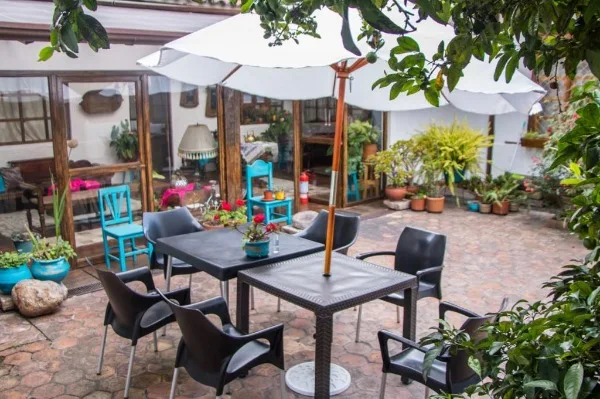Weekly ‘town meeting’ television broadcasts give Correa a powerful bully pulpit
By Sylvan Hardy
He preaches, he cajoles, he pleads. He laughs, he cries. Sometimes, he dances and sings. Almost always, the hand-picked audience applauds — and, laughs, cries, sings and dances with him.

Correa on the big screen during a Sabatina.
Called sabatinas, because they are held on Saturday, the three-hour productions combine politics and entertainment and are held in a different city or village each week. Correa has even hosted them in the U.S., Spain and Italy when he was traveling abroad.
The meetings, which have been attended by as many as 15,000, depending on the venue, are broadcast on most of Ecuador’s television channels as well as on radio, and are credited by analysts with keeping Correa’s popularity among the highest in Latin America, despite a recent decline. The show is also broadcast overseas via Skype in the U.S., Canada, Spain and Italy, where an estimated two million Ecuadorians live.
More than anything, the sabatinas serve as bully pulpit for the president and his Citizens’ Revolution. It is where he announces new government programs and policies, often pleading with his audience for support. It is where he talks about the possibility that he may seek another terms; where he discusses low oil prices, earthquake relief and volcanic eruptions.
On recent broadcasts, he told Cuenca’s mayor that the federal government would provide no more funding for the tranvía. He also defended his legal action against a military panel that refused to punish a naval officer Correa said said showed him disrespect.
He also uses sabatinas to attack his critics, often viciously, with multi-media snippets, complete with sound- and laugh-tracks.

A lighter moment in a recent broadcast.
His attacks on opponents can be vicious. In recent months, he has called leaders of protests against various government policies “terrorists,” “traitors,” and “stooges for foreign interests.” Lately, he is attacking those who will run against his Alianza Pais party in next February’s national election.
The broadcasts typically begin with a weekly report of presidential activities, during which Correa narrates video showing him at various functions and events. Recently, the video and narration followed him in visits to a home for the elderly, a school and a hydro-electric dam project.
Almost no subject is off limits. Correa has talked about football, teen pregnancy, gay rights, fishing, fast cars, pretty women and cuy recipes. Twice, he brought his family’s golden retriever on stage to show off the latest litter of puppies.

Correa meets Ecuadorians in Italy during a 2012 sabatina.
Even by international standards, the sabatinas are slick productions, with music that plays on cue and professionally produced videos. As with television sports broadcasts, the cameras scan the audience, picking out faces to show on the big screen on stage behind Correa. There’s even a sidekick, Franklin Rea, who acts as announcer and straight man for presidential jokes. There’s even an occasional visit by Tiko Tiko the clown, one of which pitted Correa against British comedian John Oliver in a social media debate in 2015 about the usefulness of clowns as political props. (For more about the incident, click here.)
Originally paid for by the government, beginning earlier this year production costs are now paid for by País and Correa’s political supporters. Opponents had attacked the productions as an extravagance the country could not afford during the current economic crisis.
“These broadcasts are is my connection with the people and their connection with me,” Correa said recently in an interview. “In the past, once a president was elected in Ecuador he usually disappeared from public sight. Maybe that’s why most presidents only lasted a year or two,” he said.
Over the years, Correa has invited singers, dancers, poets, comedians and acrobats to participate in the event. “We need to make sure that all of you are awake,” he said in June following a rock group’s presentation that ended with a burst of fireworks.
Correa concedes that three-hours may be too long but says he has a lot to talk about. “We try to keep it interesting since most of what we talk about is important,” Correa said, adding, “Sometimes, by the end, I think I’m the only one paying attention.”
Although the television audiences have declined over the past two to three years, due in part to Correa’s declining popularity, they still reach between a quarter and a third of Ecuador’s population. As they have in the past, they will play an important role in the 2017 elections.


















